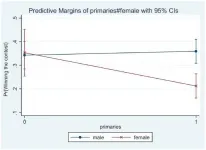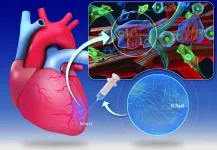(Press-News.org) More than 20 million people 65 years and older present to emergency departments each year in the United States. Roughly one third of those patients are admitted to the hospital often because they cannot be safely discharged to their home. For an older patient, hospitalization comes with the increased risk of infection, falls, delirium, functional decline and death. Hospitalizations also come with increased cost to the patient, provider and payer. According to the Centers for Medicare & Medicaid Services (CMS), the average cost of an inpatient hospital stay is more than $13,800 per Medicare beneficiary.
As the U.S. population ages, more hospitals are implementing geriatric emergency department (GED) programs with specialized staff focused on transitional care for older adults aimed at reducing unnecessary hospitalizations and improving outcomes for this vulnerable patient population. A new study finds that providing specialized geriatric emergency care results in lower Medicare expenditures up to $3,200 per beneficiary.
In the study, which will be published March 1 in JAMA Network Open, data were collected from nearly 25,000 Medicare fee-for-service beneficiaries treated at Northwestern Memorial Hospital in Chicago and Mount Sinai Medical Center in New York beginning in January 2013. The study found a significant reduction in total costs of care when beneficiaries were seen by either a transitional care nurse and/or social worker trained to deliver geriatric emergency care.
Per beneficiary, savings ranged up to $2,905 after 30 days and up to $3,202 after 60 days compared to those who did not receive care through a GED program. The study is the first to quantify the potential cost savings of GED programs.
"It is estimated that 60 percent of hospitalized Medicare patients arrive through the emergency department. When you consider the potential savings per beneficiary when geriatric emergency departments programs are implemented, it's a very significant cost reduction for patients and the payers, while also resulting in better care for older adults," said study author Scott Dresden, MD, medical director of Geriatric Emergency Department Innovations (GEDI) at Northwestern Medicine and associate professor of emergency medicine at Northwestern University Feinberg School of Medicine.
The authors believe the cost savings result from the change in health care utilization and trajectory of the patients. The GED programs in the study are staffed by specially trained nurses and/or social workers who perform comprehensive geriatric, emergency care-specific assessments to older adults who present in the emergency department. Treatment is initiated based on the needs revealed during the assessment.
"These programs focus on transitional care and have been shown to improve clinical outcomes and reduce hospitalizations, length of stay and readmissions, all of which impact cost of care," said author Ula Hwang, MD, MPH, professor of emergency medicine at Yale Medicine and previously of Mount Sinai Medical Center. "By assessing their needs and living situations in the emergency department, the nurses and social workers can connect older patients with necessary resources, such as home care, physical therapy or medical equipment, making it safe to discharge them home and avoid unnecessary inpatient admissions."
Currently, geriatric emergency care programs are not reimbursed by any health care payers, although previous studies have found positive associations of GED programs with clinical outcomes, including decreased hospitalizations, intensive care admissions, 30-day readmissions and cost. The authors hope their findings serve as a framework that may be used when calculating the bundled value and potential reimbursement per patient for GED care programs by CMS and other payers.
"While more hospitals and health care systems have incorporated geriatric emergency programs, most have not and without reimbursement they are not incentivized to do so," said Dr. Dresden. "These programs not only improve care and outcomes for older adults, but also have direct economic value for patients and payers. Hospitals and clinicians who incorporate these integrated geriatric care programs in their emergency departments should receive the benefit of shared savings."
Northwestern Memorial, Mount Sinai and St. Joseph's Regional Medical Center in Paterson, NJ, were the first hospitals in the country to launch geriatric emergency departments through the "Geriatric Emergency Department Innovations in care through Workforce, Informatics, and Structural Enhancements" (GEDI WISE) program in 2013. In 2018, the first GED accreditation program was created by the American College of Emergency Physicians (ACEP) to recognize hospitals for higher levels of geriatric emergency care and to improve and standardize emergency care for the nation's older adults. Today, more than 200 hospitals worldwide have achieved Geriatric Emergency Department Accreditation (GEDA). Accreditation is given at three levels and is adaptable based on a hospital's needs and resources.
Northwestern Memorial was the first hospital in Illinois and among the first in the nation to achieve Level One GEDA, the highest tier of the ACEP's interdisciplinary standards. Since launching its geriatric emergency program in 2013, Northwestern Memorial has seen a decrease of unnecessary hospitalizations of older patients by 33 percent.
"We're really proud of what our geriatric emergency department has achieved. When we discharge an older adult, we can be confident that we are sending them home safely and providing them with the appropriate transitional care that they need," said Dr. Dresden. "This study reinforces our experience at Northwestern that providing specialized geriatric care from dedicated staff and focusing on transitional care, our older patients have better outcomes, fewer hospitalizations and there's substantial cost savings to the patients, and payers. Programs like this have a very positive impact for hospitals and their older patients."
INFORMATION:
To learn more about Northwestern Medicine, visit https://www.nm.org/about-us/northwestern-medicine-newsroom/media-relations/about-our-health-system.
To access study on Monday, 3/1/21, after 10 am CT, visit: https://jamanetwork.com/journals/jamanetworkopen/fullarticle/10.1001/jamanetworkopen.2020.37334?utm_source=For_The_Media&utm_medium=referral&utm_campaign=ftm_links&utm_term=030121. *
*Reporters may request the embargoed paper by emailing mediarelations@jamanetwork.org
As the planet warms, scientists expect that mountain snowpack should melt progressively earlier in the year. However, observations in the U.S. show that as temperatures have risen, snowpack melt is relatively unaffected in some regions while others can experience snowpack melt a month earlier in the year.
This discrepancy in the timing of snowpack disappearance--the date in the spring when all the winter snow has melted--is the focus of new research by scientists at Scripps Institution of Oceanography at the University of California San Diego.
In a new study published March 1 in the journal Nature Climate ...
For the first time, scientists have assessed how many corals there are in the Pacific Ocean--and evaluated their risk of extinction.
While the answer to "how many coral species are there?" is 'Googleable', until now scientists didn't know how many individual coral colonies there are in the world.
"In the Pacific, we estimate there are roughly half a trillion corals," said the study lead author, Dr Andy Dietzel from the ARC Centre of Excellence for Coral Reef Studies at James Cook University (Coral CoE at JCU).
"This is about the same number of trees in the Amazon, or ...
UNIVERSITY OF CALIFORNIA, SAN FRANCISCO
UNIVERSITY OF TORONTO
Toronto, ON - Children in the United States who have more screen time at ages 9-10 are more likely to develop binge-eating disorder one year later, according to a new national study.
The study, published in the International Journal of Eating Disorders on March 1, found that each additional hour spent on social media was associated with a 62% higher risk of binge-eating disorder one year later. It also found that each additional hour spent watching or streaming television or movies led to a 39% ...
HANOVER, N.H. - March 1, 2020 - During World War II, British intelligence agents planted false documents on a corpse to fool Nazi Germany into preparing for an assault on Greece. "Operation Mincemeat" was a success, and covered the actual Allied invasion of Sicily.
The "canary trap" technique in espionage spreads multiple versions of false documents to conceal a secret. Canary traps can be used to sniff out information leaks, or as in WWII, to create distractions that hide valuable information.
WE-FORGE, a new data protection system designed at Dartmouth's Department ...
Assessing a drug compound by its activity, not simply its structure, is a new approach that could speed the search for COVID-19 therapies and reveal more potential therapies for other diseases.
This action-based focus -- called biological activity-based modeling (BABM) -- forms the core of a new approach developed by National Center for Advancing Translational Sciences (NCATS) researchers and others. NCATS is part of the National Institutes of Health (NIH). Researchers used BABM to look for potential anti-SARS-CoV-2 agents whose actions, not their structures, are similar to those of compounds already shown to be effective.
NCATS scientists ...
The hidden social, environmental and health costs of the world's energy and transport sectors is equal to more than a quarter of the globe's entire economic output, new research from the University of Sussex Business School and Hanyang University reveals.
According to analysis carried out by Professor Benjamin K. Sovacool and Professor Jinsoo Kim, the combined externalities for the energy and transport sectors worldwide is an estimated average of $24.662 trillion - the equivalent to 28.7% of global Gross Domestic Product.
The study found that the true cost of coal should be more than twice as high as current prices when factoring in the currently unaccounted ...
A study by two researchers at the UPF Department of Political and Social Sciences (DCPIS) has examined the effect of selecting party leaders by direct vote by the entire membership (a process known in southern Europe as "primaries" and in English-speaking countries as "one-member-one -vote", OMOV) on the likelihood of a woman winning a leadership competition against male rivals.
Javier Astudillo and Andreu Paneque, a tenured lecturer and PhD with the DCPIS, respectively, and members of the Institutions and Political Actors Research Group, are the authors of the article published recently in the journal ...
TROY, N.Y. -- The era of widespread remote learning brought about by the COVID-19 pandemic requires online testing methods that effectively prevent cheating, especially in the form of collusion among students. With concerns about cheating on the rise across the country, a solution that also maintains student privacy is particularly valuable.
In research published today in npj Science of Learning, engineers from Rensselaer Polytechnic Institute demonstrate how a testing strategy they call "distanced online testing" can effectively reduce students' ability to receive help from one another in order to score higher on a test taken at individual homes during social distancing.
"Often in remote online exams, students ...
A group of researchers including Tiago Falótico, a Brazilian primatologist at the University of São Paulo's School of Arts, Sciences and Humanities (EACH-USP), archeologists at Spain's Catalan Institute of Human Paleoecology and Social Evolution (IPHES) and University College London in the UK, and an anthropologist at the Max Planck Institute for Evolutionary Anthropology in Germany, have published an article in the Journal of Archeological Science: Reports describing an analysis of stone tools used by bearded capuchin monkeys (Sapajus libidinosus) that inhabit ...
Researchers at CÚRAM, the SFI Research Centre for Medical Devices based at National University of Ireland Galway, and BIOFORGE Lab, at the University of Valladolid in Spain, have developed an injectable hydrogel that could help repair and prevent further damage to the heart muscle after a heart attack.
The results of their research have just been published in the prestigious journal Science Translational Medicine.
Myocardial infarction or heart disease is a leading cause of death due to the irreversible damage caused to the heart muscle (cardiac tissue) during a heart attack. The regeneration of cardiac tissue is minimal so that the damage caused cannot be repaired by itself. ...





